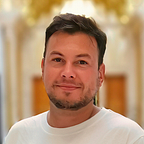The case for (re)decentralizing the Internet
By Stephan Tual
“Our identities have no bodies, so, unlike you, we cannot obtain order by physical coercion. We believe that from ethics, enlightened self-interest, and the commonweal, our governance will emerge”
John Perry Barlow — A Declaration of the Independence of Cyberspace, 1996.
Two and half decades after its inception, the Internet now underpins our entire planet’s telecommunications. It fulfills our natural human compulsion to share, communicate and collaborate. For most readers, the idea of losing access to the Internet probably evokes fears of a return to dark ages where our reach into this world was limited to what we had physical access to. The Internet has become an extension of our selves, and smartphones have in effect metamorphosed us into cyborgs, bar only the electronics that haven’t made their way inside our bodies — yet.
Organizing our lives online is the ‘new normal’. There is no way back, nor is there an off switch. Look around you, and ponder on the significance that anyone under 20 years of age will never have known a world without the Internet.
But whose Internet? The ultimate decentralized network has progressively devolved into an array of gargantuan-sized stacks, where the utilities of our 21st century (communication, reputation, payment processing) are run by monolithic companies, where our private conversations have become fair game to data analytics, and where the thirst for innovation has been replaced with a fetish for monetization. John Barlow’s Cyberspace, the 1990's virtual frontier heralding a new era of self governance, is not moribund: it’s dead. My condolences, John: I, too, once believed.
We’re fed up with this encroachment on our privacy, from ISPs charging their users for the privilege of not being spied on, to social networks conducting clandestine research on mood alteration. And yet, the worst is still to come, courtesy of the Internet of Things: TVs that record our living room conversations, mobile phones that 3D map our homes, glassware that documents everything you drink.
From a dramatic overreach in commercial and personal privacy will potentially emerge the greatest weapon for oppression in the history of mankind.
The root cause of this affliction lies in that absolutely everything we do on the Internet today requires us to put our trust into one or several organizations. We trust social networks to shield the pictures of our children from prying eyes, our banks to safeguard our funds, cloud storage to keep our accounting and documents private. We automatically assume the organizations providing these vital services will always be honest, secure and accountable. We trust them to take care of our data with the utmost level of care it naturally requires.
Yet, the inner workings of organizations we use every day — small or large — are kept opaque and thus there is no guarantee whatsoever that they will do what they say they would, nor are there any guarantee that they won’t pivot, or go out of business, or be acquired by businesses with different policies.
In order to collaborate and exchange, we have to go via these closed sources services while our own communications, funds, and personal data stay vulnerable to hackers, advertisers, government agencies or plain ineptitude.
The solution: to flip this model on its head, so that the inner workings of organizations become fully transparent and immutable, while our interactions are kept safe and encrypted from end to end.
But how do you keep secure what is open and visible to all? Can a service open source its code and remain competitive? And can you advertise, and make your user base benefit from commercial offers if all communications are truly private? Impossible task? Not quite.
Using blockchain technology, IBM and Samsung are already exploring how washing machines could be made autonomous, reordering detergent as needed and negotiating the best deals on our behalf as part of an optimal ‘Economy of Things’. This is the first step in bringing the processing power to the edge of the network and enabling data analytics that never leave the safe confines of our home.
The work we’ve done so far shows that such a network is indeed possible. A new kind of network: one where participation is optional and where users only pay for what they use. A network that provides the toolset for a sharing economy with no middleman. A network that allows for the existence of applications you do not have to trust, because they provably do what they are programmed to. A network where universal services such as insurance, identity, reputation and marketplaces of all kinds are owned by everyone, therefore owned by no one.
It is time we envision the Internet as a global public good rather than an arena of conflicting private interests. It is time for (re)decentralization.
About the Author
Stephan Tual is the Founder of the world’s first blockchain Consultancy, Ursium (http://www.ursium.com)
In January 2014, Stephan joined the Ethereum project as CCO. His current focus is on the intersection of blockchain technology and embedded hardware, where autonomous agents can transact as part of an optimal Internet of Things economy.
An established thought leader on blockchain technology, decentralization and DAOs/DACs, Stephan regularly speaks at conferences, community events and meetups, and is the media contact for the Ethereum project.
Twitter: @stephantual
Contact: http://www.ursium.com/contact/
If you enjoyed reading this, please log in and click “Recommend” below.
This will help to share the story with others.
